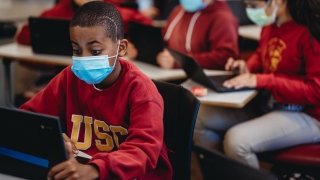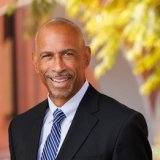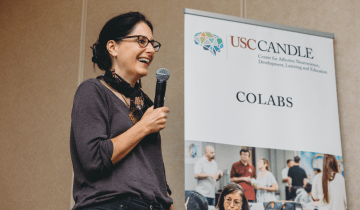We are at a crossroads in American education. The pandemic exposed the deep inequities embedded in our system. For a moment during the crisis, there were calls for change and reform, but as schools reopened and life returned to normal, that sense of urgency faded. But the crisis has not passed for our students and society. Given the significant gaps in learning opportunities that exist throughout our nation, it’s hardly surprising that test scores show that children in every state have fallen behind. Academic challenges are now compounded by increased concerns about mental health, severe economic hardships and a growing shortage of teachers.
In this special double issue, we’ll examine what’s happening in our schools here in L.A. and across the country and introduce you to some of our faculty, students and alumni who are working to address these troubling trends.
At USC Rossier, we have a proud legacy of conducting research, preparing educators and creating learning opportunities. But to respond effectively to the current challenges facing education, we must commit ourselves to working in new and different ways. In November, we announced the USC Rossier Educational Equity Initiative. This ambitious agenda consists of five projects we believe will enable USC Rossier to respond effectively to many of the challenges facing schools and colleges, locally and throughout the nation:
- USC Rossier will partner with Los Angeles Unified School District schools in south and east L.A. to bring the best of USC to historically under-resourced neighborhoods. These schools will promote innovative and comprehensive teacher preparation, training in social-emotional learning for both teachers and students, a laboratory space for education researchers, and a focus on the individuality of students.
- We will expand our highly successful Teacher Residency Program. The program provides full scholarships and financial support to students who have committed to working in L.A. public schools after graduation. Our goal is to expand this program to other schools and districts, and to increase the number of teachers trained, particularly in math and science.
- This spring, we are launching the USC Rossier STEAM Teaching and Research Center. This will serve as a research and practice hub focused on reimagining, improving and sustaining high-quality STEAM teaching and learning in K–12 classrooms in a way that authentically connects to students, including through the arts. Access to a robust and rigorous education in these areas is critical to expanding opportunities for children and addressing the challenges facing our nation and the world in the 21st century.
- Next year, we will launch the Los Angeles Education Policy Solutions Hub. Under USC Rossier’s leadership, the L.A. Hub will bring together researchers, local education leaders, policymakers and elected officials to examine issues and inform decision-making from early childhood through higher education. The L.A. Hub will combine the rigor of university-based research with rapid in-person and web-based briefings, providing policymakers with the evidence they need in a format they can use, when they need it.
- This fall, the USC Democracy Project began piloting a curriculum that will give teachers the support they urgently need to address controversial topics in the classroom. The goal is to give teachers tools to help students learn about complex issues—the pilot curriculum covers immigration—while simultaneously teaching them how to do independent research and engage in civil discourse.
In the coming months, we will tell you more about these projects. We hope you will join us in advancing equity for all learners.
Fight On!
Pedro A. Noguera, PhD Distinguished Professor of Education Emery Stoops and Joyce King Stoops Dean USC Rossier School of Education





